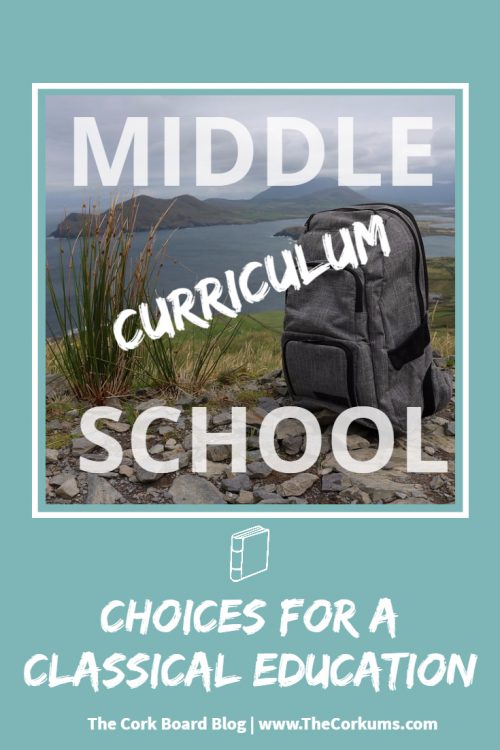
Our homeschool community, Bridges, is officially back at full swing. I’m excited to be the tutor for our Logic level program which is equivalent to 7 and 8 grade (middle school). We do both grades together with a 2-year curriculum that can be taken in any order.
This is the stage where learning is driven by asking questions and applying formal logic to check your answers. In addition to traditional core subjects, one year we cover formal logic, and the other year we do fallacies. We’re on fallacies this year and using the popular Fallacy Detective book. My favorite teaching book on this stage of education is The Question by Leigh Bortins (feelings about CC aside).
Here’s the line up for this year.
Latin-I use Henle First Year as my base. I teach it from beginning to end each year adjusting the assignments for first and second year students respectively. I focus less on memorization and more on how to use a set of declension and conjugation charts and a dictionary to translate. If students have come through our Grammar (or grade school program), they have a tremendous grasp of English grammar and the Latin follows much easier than the students anticipate. I also find that moving quickly through the book keeps their attention more than spending an entire year on declensions and not understanding verbs and other parts of speech until later levels and years.
Science-I’m pulling from Science World magazine and ScienceWise 2 to design discussion-based and experiential lessons. The students will also be writing formal lab reports based on the scientific method.
English– Writing is integrated across many of the subjects. We continue to use IEW tools to guide us. For literature, we will read one classic together and dig deeper into the IEW critique model as well as explore literary critique methods and vocabulary. The rest of the books are student chosen. Each month the students read a book, write a critique, and present it to the class. I was inspired to use a more student driven approach for choosing literature after reading the Reader’s Odyssey.
Health– We’ll be reading and discussing articles from Scholastic Choices magazine.
Social Studies-The focus will be on world geography and current events. I like the Mapping the World with Art curriculum because it also checks off the required art box requirement for our state. I have the students read the lesson’s reading at home, and we complete the drawing lesson in class. We don’t do the extra enrichment activities. Additionally, we’re using Seterra to help us memorize all the countries in the world. We’re going continent by continent. For current events, the class has a subscription to WORLD Teen (yes, we’re magazine heavy in this year of the curriculum). We’ll be doing discussion around those articles through the month.
Bible-We’ll start by exploring praying in the Bible. Then we’ll study and pray for countries around the world using
Window on the World: When We Pray God Works which ties into our World Geography focus. We’ll also learn about world religions as we go.
Math– Because math is the one thing I couldn’t figure out how to teach modularly, we just provide some math study hall time. Fallacy Detective won’t take us all year, so we will also use Uncle Eric Talks about Personal Career and Financial Security as an intro to economics.
I’m in the market for a great one-year, comprehensive formal, logic course for next year. Any recommendations?




